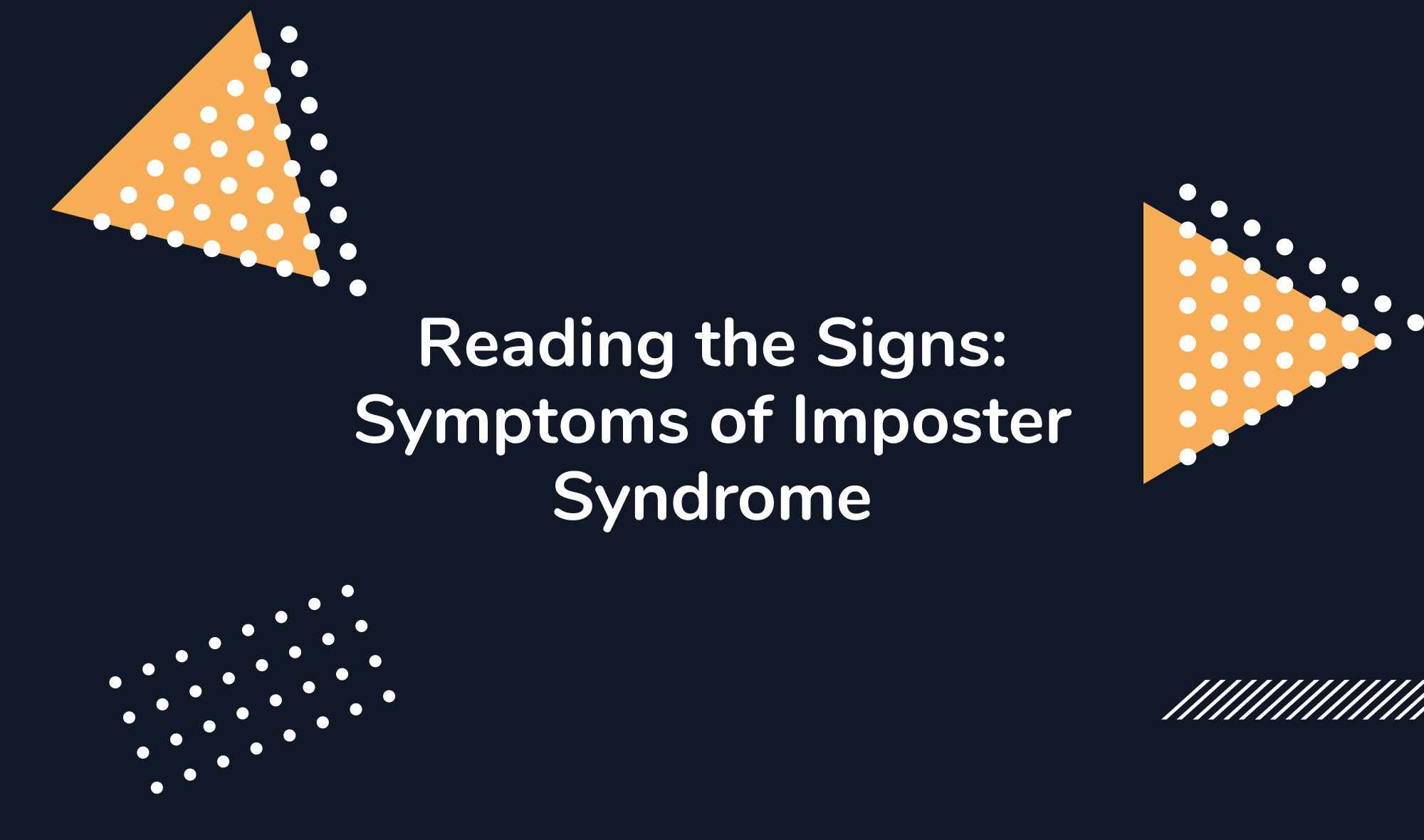Unveiling the Mystery: What Causes Imposter Syndrome?
By Remy Meraz • July 2, 2023
Key Takeaways
- Imposter Syndrome is a psychological pattern where individuals doubt their achievements and fear being seen as a fraud.
- Its causes can be both personal and societal, often rooted in perfectionism, fear of failure, or family and work pressures.
- Common symptoms include self-doubt, attributing success to luck, fear of failure, and overworking.
- Understanding the distinction between Imposter Phenomenon and Imposter Syndrome can be enlightening.
- There are practical strategies to overcome Imposter Syndrome, including acknowledging the feelings, seeking support, and practicing self-compassion.

Imagine sitting at the pinnacle of your professional career, having earned accolades for your prowess and competence, yet feeling an overwhelming sense of doubt. You glance at your achievements, your heart seized with fear. Fear of being exposed as a fraud. This paradox, where success fails to inspire confidence but fuels insecurity, is known as Imposter Syndrome.
Imposter Syndrome, often associated with high-achieving women and men alike, paints an image of oneself not as a successful individual, but rather as a meticulous fraud, adept at fooling those around. Research suggests that approximately 70% of people have experienced at least one episode of Imposter Syndrome in their lifetime. It's not an official diagnosis in the realm of mental health, yet its consequences on self-esteem, job satisfaction, and overall well-being can't be overlooked.
In this in-depth article, we delve into the causes of Imposter Syndrome, the feelings that accompany it, and the strategies to overcome this self-imposed mental hurdle. We will explore how personality traits, social anxiety, and low self-esteem are intertwined with the imposter phenomenon. We'll discuss how this "fraud syndrome" affects capable people, how it manifests in various types, and how it tends to perpetuate an imposter cycle, according to a systematic review from the fields of general internal medicine and behavioral science. Furthermore, we will illuminate the tools for combating negative self-talk, cultivating self-compassion, and developing resilience against imposter feelings.
Whether you've personally experienced Imposter Syndrome or want to understand it better, this exploration aims to provide clarity on the causes and provide valuable mental health resources. So sit tight, brace yourself for a journey into the world of Imposter Syndrome, and learn how to feel confident, proud, and at peace with your own abilities.
Stay tuned for a deep dive into the elusive enigma of Imposter Syndrome. Let's start unveiling the mystery!
Join our Newsletter
Transform your career with our personal growth insights. Get one valuable tip right in your inbox every Saturday morning.
Defining the Imposter: Understanding Imposter Syndrome
Imposter Syndrome, also known as Impostor Phenomenon or Fraud Syndrome, is a psychological pattern in which individuals doubt their accomplishments and harbor an internalized fear of being exposed as a fraud. People with Imposter Syndrome often feel that they've somehow deceived others into thinking they're more competent or talented than they believe themselves to be. This complex mesh of self-doubt and fear can lead to stress, anxiety, and a lingering sense of being an imposter, hence the name "Imposter Syndrome".
The term "Imposter Syndrome" was first coined in 1978 by clinical psychologists Dr. Pauline R. Clance and Suzanne A. Imes. They noticed that despite having adequate external evidence of accomplishments, some high achieving women tended to believe they were not intelligent and were "fooling" anyone who thought otherwise. This Imposter Phenomenon was not just limited to women but found its roots across all genders, emphasizing that this syndrome is a universal experience.
Imposter Syndrome doesn't discriminate - it affects everyone, from high school students to high-level executives. Whether it's feeling like a fraud when praised for a job well done or attributing your success to luck rather than your own abilities, Imposter Syndrome can severely impact one's mental health and professional growth.
If you wish to delve deeper into this concept, refer to these comprehensive articles from Psychology Today and WebMD. They offer a thorough insight into the world of Imposter Syndrome, its effects, and how it intertwines with other mental health conditions.
Psychology Today on Imposter Syndrome
WebMD on What is Imposter Syndrome
Unveiling the Mystery: What Causes Imposter Syndrome?

Imposter Syndrome can be ignited by a combination of psychological, societal, and environmental factors. Understanding the roots of this phenomenon is the first step towards managing and eventually overcoming Imposter Syndrome.
Psychological Factors: Imposter feelings often stem from early family dynamics. Children who grow up in families that place a high emphasis on achievement can internalize these expectations and develop Imposter Syndrome when they feel they aren't living up to their family's expectations. Certain personality traits, such as perfectionism or the tendency to attribute success to external factors rather than their own abilities, can also contribute to Imposter Syndrome.
Societal Factors: Society plays a significant role in shaping our thoughts and perceptions about ourselves. Gender stereotypes, for example, can create additional pressures leading to the development of Imposter Syndrome. For instance, women who excel in traditionally male-dominated fields might experience Imposter Syndrome due to societal biases. Likewise, societal expectations about what constitutes "success" can lead to unrealistic expectations and a perpetual fear of being exposed as a fraud.
Environmental Factors: Professional settings can often fuel the flames of Imposter Syndrome. High-pressure work environments, the need to constantly prove oneself, and the fear of not meeting organizational expectations can cause individuals to doubt their abilities and achievements.
For a more comprehensive understanding of the causes of Imposter Syndrome, we recommend you to visit Psycom. This platform provides a deep dive into the causes and effects of Imposter Syndrome, along with solutions to overcome it.
In our previous article, we discussed Imposter Syndrome at Work. Here, we explore how imposter feelings can manifest in a professional setting and provide some practical tips for dealing with it.
Reading the Signs: Symptoms of Imposter Syndrome

Recognizing the symptoms of Imposter Syndrome is the initial step towards confronting it. These symptoms can manifest in various ways, and can have a significant impact on one's mental health and well-being.
Self-Doubt: A persistent sense of self-doubt is a common symptom. You might question your own abilities, or feel like a fraud who will be exposed at any time.
Attributing Success to Luck: Another symptom is the tendency to attribute successes to luck, timing, or external factors, rather than one's own skills or qualifications.
Discounting Praise: People with Imposter Syndrome tend to dismiss praise or positive feedback. They find it hard to accept compliments and often feel like their success is unearned.
Fear of Failure: This syndrome can create a strong fear of failure. This fear can lead to excessive perfectionism and over-preparation, or conversely, procrastination and avoidance.
Overworking: In an attempt to cover up perceived inadequacies, individuals might work harder and longer than their peers, which can lead to burnout and other mental health issues.
For instance, consider the case of a high-achieving woman named Jane. Despite consistently earning praise and promotions at her job, Jane constantly worries about being exposed as a fraud. She frequently stays late at work to ensure her projects are perfect, and brushes off compliments from her colleagues, attributing her success to luck or the help of others.
For a more in-depth exploration of the symptoms of Imposter Syndrome, you may want to visit Verywellmind. This resource provides a comprehensive overview of the signs and symptoms of this syndrome, and offers insight into the connection between Imposter Syndrome and other mental health conditions, such as social anxiety disorder.
Join our Newsletter
Transform your career with our personal growth insights. Get one valuable tip right in your inbox every Saturday morning.
Where Does Imposter Syndrome Come From?
The origins of Imposter Syndrome can be traced back to a combination of societal and psychological factors. Both sociological and psychological perspectives offer valuable insight into the roots of this pervasive syndrome.
Sociological Perspective: From a sociological perspective, Imposter Syndrome can be seen as a product of societal expectations and norms. In a culture that heavily emphasizes achievement and success, feelings of inadequacy can surface when one feels they are not meeting these high standards. This can particularly affect individuals from minority backgrounds or those in fields where they are underrepresented, as they often face additional pressure to prove their worth.
Psychological Perspective: On the psychological front, childhood experiences and family dynamics play a significant role in the development of Imposter Syndrome. For instance, growing up in an environment where worth is equated with achievement can foster feelings of fraudulence. Similarly, if parents alternated between over-praise and criticism, an individual might feel they can never truly live up to expectations, causing feelings of being an 'imposter'.
A deeper analysis of the origins of Imposter Syndrome can be found in the book, "The Imposter Cure" by Dr. Jessamy Hibberd. This insightful read delves into the psychological basis of the syndrome, offering a fresh perspective and practical solutions to overcome it.
Imposter Phenomenon Vs Imposter Syndrome: Is There A Difference?
The terms "Imposter Syndrome" and "Imposter Phenomenon" are often used interchangeably, but they originate from different perspectives of understanding the same psychological pattern. Here, we'll delve into the nuances that differentiate these two concepts.
Imposter Syndrome: This term is widely used in popular culture and the media to describe individuals who, despite their achievements, persistently doubt their abilities and fear being exposed as a fraud. As we've previously discussed, Imposter Syndrome is not a clinical diagnosis, but it is a very real experience for many people.
Imposter Phenomenon: The term "Imposter Phenomenon" was first introduced by psychologists Dr. Pauline R. Clance and Dr. Suzanne A. Imes in their groundbreaking 1978 paper. They used this term to describe high-achieving individuals who, despite their objective successes, failed to internalize their accomplishments and feared being seen as intellectual frauds.
While both terms essentially describe the same experience, the original term "Imposter Phenomenon" underscores the idea that this experience is not a syndrome or a disorder, but rather a common psychological pattern seen across various populations.
Trigger Alert: What Provokes Imposter Syndrome?
Recognizing what triggers Imposter Syndrome is the first step towards tackling it. The common triggers often revolve around instances where individuals find themselves in new or challenging environments. Let's delve into some of the typical triggers.
- New environments or tasks: Whether starting a new job, taking on a new project, or moving to a new city, unfamiliar environments can often induce feelings of being an imposter.
- High-achieving individuals: Contrary to popular belief, high achievers often wrestle with Imposter Syndrome. Despite their accomplishments, they might feel that they're not deserving of their success and fear that others will expose them as frauds.
- Perfectionism: Striving for perfection and setting unrealistically high standards can often lead to feelings of Imposter Syndrome. When the results are anything less than perfect, individuals may question their abilities and fear being exposed as a fraud.
- Competitive environments: Working or studying in competitive environments where everyone seems to excel can lead to comparisons and feelings of inadequacy, triggering Imposter Syndrome.
- Imposter incidents: Specific incidents can invoke a sense of being an imposter, such as receiving praise or awards that one feels undeserving of, or having one's mistakes or failures pointed out.
For a more in-depth understanding of these triggers and real-life examples of how they manifest, I highly recommend reading this insightful article on Lionesses of Africa.
Imposter Syndrome Facts: Separating Truth from Misconceptions
Imposter Syndrome, while widely discussed, is often misunderstood. To further our comprehension of this psychological phenomenon, let's break down some key facts and dispel common misconceptions.
Facts About Imposter Syndrome
- Prevalence: Imposter Syndrome is not a rare experience. Studies suggest that up to 70% of people will experience Imposter Syndrome at some point in their lives.
- Impacts All: It affects individuals regardless of their success level. Even highly successful and accomplished individuals like Albert Einstein and Maya Angelou have reportedly struggled with Imposter Syndrome.
- Gender-Neutral: While initially thought to predominantly affect women, recent studies indicate that Imposter Syndrome is not gender-specific and affects men just as much as it does women.
- Inhibits Performance: Chronic feelings of being an imposter can lead to anxiety and depression, which can hinder job performance and satisfaction.
- Linked to Perfectionism: Imposter Syndrome is often associated with perfectionism. The fear of failure or making mistakes is prevalent among those with Imposter Syndrome.
Misconceptions About Imposter Syndrome
- Not a Psychological Disorder: Although referred to as a syndrome, Imposter Syndrome is not officially recognized as a psychological disorder.
- Not Just Low Self-Esteem: Imposter Syndrome goes beyond low self-esteem. Even people with high self-esteem can experience it when facing new challenges or ventures.
- Success Doesn't Cure It: Achieving success does not necessarily cure Imposter Syndrome. Sometimes, success can even amplify the feelings as the individual fears their deception will be discovered.
For a more comprehensive understanding, including research and personal accounts, "The Confidence Code" by Katty Kay and Claire Shipman is a highly recommended read. You can find it on Amazon.
Conquering the Imposter: How to Overcome Imposter Syndrome
While Imposter Syndrome can be a challenging psychological experience, it's not insurmountable. Here are some practical strategies and inspiring stories that illustrate how individuals can effectively manage and overcome their Imposter Syndrome.
Strategies to Overcome Imposter Syndrome
- Acknowledge Your Feelings: The first step in dealing with Imposter Syndrome is acknowledging its presence. Recognizing your feelings of self-doubt and fraudulence is a crucial initial step towards overcoming it.
- Keep a Success Journal: Record your achievements, big or small. Having a written account of your successes can help combat feelings of inadequacy.
- Seek Feedback: Regular feedback from colleagues, friends, and mentors can provide an objective perspective on your abilities and achievements, challenging your internal narrative.
- Practice Self-Compassion: Be kind to yourself when you make mistakes or face failure. Accept that everyone, even the most successful people, stumble sometimes.
- Reframe Failure: View failures or mistakes as opportunities to learn and grow rather than as evidence of incompetence.
Real-Life Stories of Overcoming Imposter Syndrome
Countless individuals have successfully managed their Imposter Syndrome and used their experiences to drive their personal and professional growth. From CEOs to award-winning artists, many have turned their self-doubt into a source of motivation, proving that it's possible to conquer the imposter within.
A thorough resource that offers more practical steps on overcoming Imposter Syndrome is The Muse. For a more detailed exploration of coping strategies, refer to our previous blog post on How to Deal with Imposter Syndrome.
Conclusion: Empowerment Beyond Imposter Syndrome
In our journey to explore Imposter Syndrome, we've delved into its origins, causes, symptoms, and effective strategies for overcoming it. While grappling with Imposter Syndrome can indeed be a taxing experience, it's important to remember that you are not alone. Countless individuals across various walks of life have navigated their way through similar feelings of self-doubt and emerged stronger on the other side.
The first step towards conquering this pervasive psychological phenomenon is acknowledgment, followed by employing effective coping strategies, seeking support, and demonstrating self-compassion. By understanding the mechanics of Imposter Syndrome, we can start to dismantle the impostor within us, gradually replacing self-doubt with self-confidence.
Imposter Syndrome doesn't have to define us. Instead, we can use it as a stepping stone to better understand our mental landscape, helping us strive for authentic self-confidence in our professional and personal lives.
In the words of Maya Angelou, a well-known literary figure who herself struggled with Imposter Syndrome, "You alone are enough. You have nothing to prove to anybody." By internalizing this message, we can begin to silence the imposter within and foster an empowering sense of self-belief.
If you'd like to continue exploring topics related to personal development, resilience, or coping strategies for workplace challenges, we invite you to browse our blog or learn about our personal coaching services.
Read more about: Imposter Syndrome, Life Coaching
About Remy Meraz
Remy Meraz, co-founder, and CEO of Zella Life, is a visionary leader who leveraged corporate glass ceiling challenges as a woman of color to drive systemic change.
While leading and cultivating high-performance teams from VC-backed startups to Fortune 500, she consistently faced obstacles such as inadequate mentorship, lack of psychological safety, and non-personalized training. Taking matters into her own hands, she turned to executive coaching and NLP training. This life-changing growth experience led to breaking leadership barriers and a passion for cognitive psychology.
Motivated by her experiences, she co-founded Zella Life, an innovative AI-driven coaching platform bridging the talent development gap by enhancing soft skills and emotional intelligence (EQ) in the workplace.
Her vision with Zella Life is to transform professional development into an inclusive and impactful journey, focused on the distinct needs of both individuals and organizations. She aims to promote advancement and culture change by ensuring every professional's growth is acknowledged and supported.
Today, Remy is recognized as an influential innovator, trainer, mentor, and business leader. Under her leadership, Zella Life has delivered significant measurable outcomes for numerous well-known brands. This track record of positive outcomes garnered attention and funding from Google for Startups and Pledge LA, establishing Zella Life as a pivotal force in the learning and development arena tackling and resolving fundamental talent development issues for organizations of all sizes.